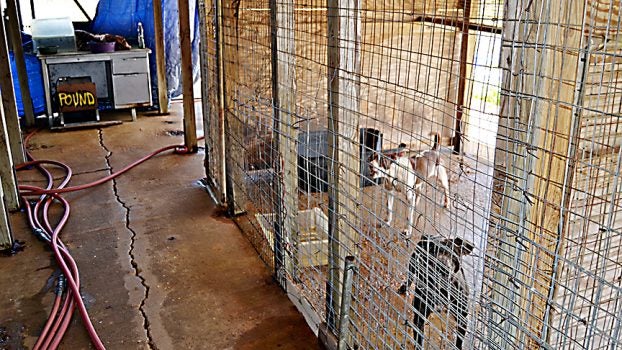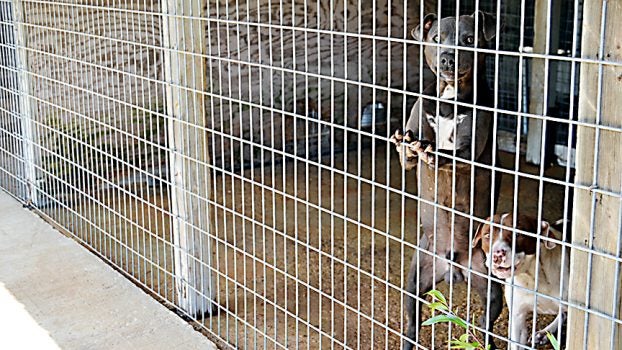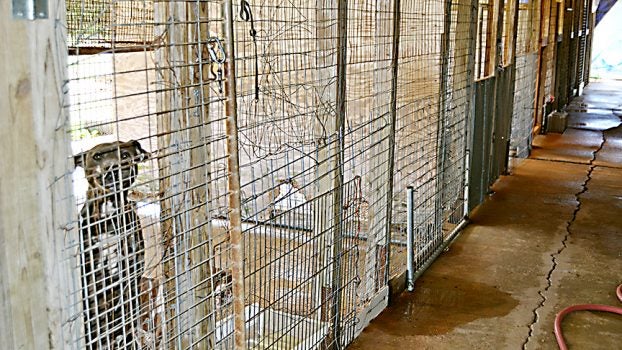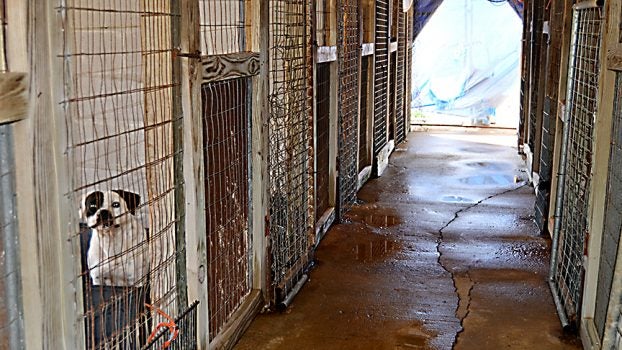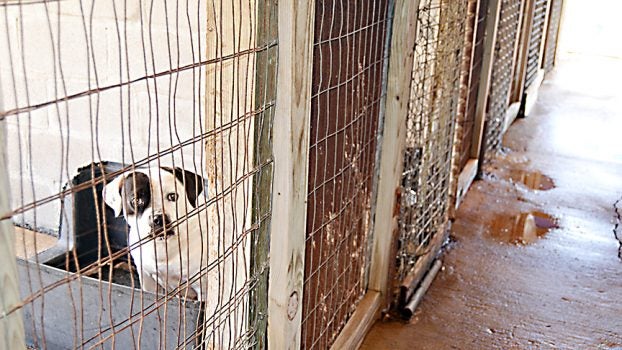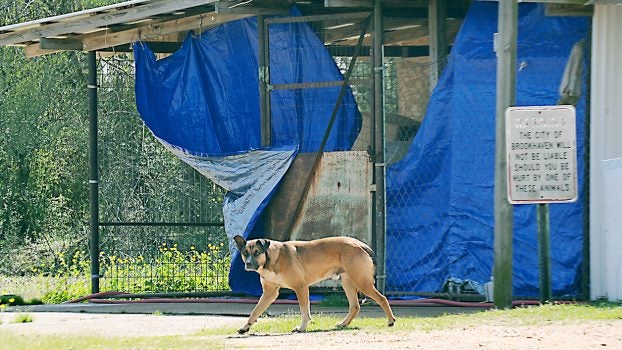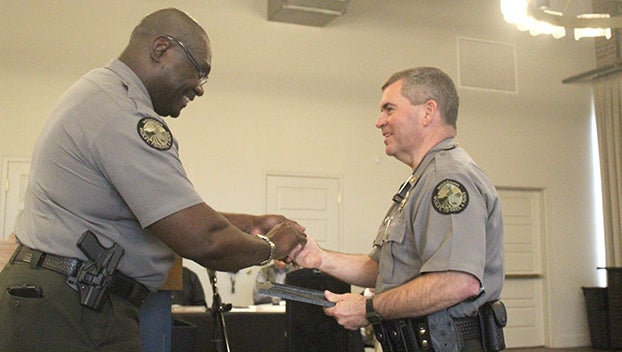A year later and still no shelter
Published 8:50 pm Saturday, February 25, 2017
It’s been a year since city officials last publicly discussed a new animal shelter for Brookhaven’s lost, unwanted and stray dogs. The Board of Aldermen’s attorney, Joe Fernald, said other city business came first — neighborhood improvements, road repairs, water and sewer projects. Those took priority over the shelter, he said. Meanwhile, dogs wait for their fates to be decided at the Brookhaven Animal Shelter.
Less than a dozen dogs were in pens there Thursday. Some growled ferociously, some wagged their tails hoping for rescue, one refused to make eye contact and cowered in the corner of the pen.
The shelter sits at the end of a dirt road that winds past the pits and piles of debris at the city dump. Two rows of dog runs, about 18 total, are covered with a sheet-metal roof. One wall is closed in with sheet metal. The other side is open. The front end is wire fencing, but is partially covered by two blue tarps.
A handpainted board inside the building says “Pound.”Orange kiddie pools, broken dog houses and an air conditioning unit sit piled up nearby.
A sign in front of the building reads: “Warning. The City of Brookhaven will not be liable should you be hurt by one of these animals.”A locked metal bar across the road blocks visitors from the shelter when an animal control officer isn’t there.
Brookhaven elected officials are impressed with the Lauderdale County Animal Control Shelter in Meridian and would like to model a shelter after that one.
Mayor Joe Cox said $100,000 out of the city’s general fund has been earmarked to build the shelter.“Our engineering firm is working on a design for the new animal shelter,” Cox said. “We visited the facility in Meridian recently and plan to model our facility and operations after theirs.” It was about this time last year that city officials first said they were working on plans for a new facility. The city attempted to improve the Brookhaven shelter in October 2015 and allocated $20,000 to the group Friends of the Brookhaven City Animal Shelter.
Lu Becker, president of the Brookhaven Animal Rescue League, said since the facility is open to the elements, the Friends group planned to put up a wall to shelter the animals from winter winds, plant trees for shade, and replace the kennels. Then the city decided a few months later that the project was too dangerous and having volunteers at the landfill could be a liability.
The group returned what was left of the money.
Animal control officer Roxanne Norton said the shelter saw about 300 dogs last year. She and officer Orlando Little keep track of all incoming animals with a log, which gives details about the animals, including their behaviors. Norton tries to find private adoptees and no-kill shelters that will take the animals by posting their pictures and information on her personal Facebook page.
“I have a lot of friends here in Mississippi who run shelters, and they come out and get five to six dogs at a time,” she said. “BARL has also took a lot of them off my hands.”
Norton said that most animals are transported or adopted, and she has only a few cases where no one wanted to adopt a dog. Some dogs are killed.
“If it is a red zone case, it may have to be euthanized, but that rarely comes because I can get them to come around to be adoptable,” she said. “Maybe one out of a year is impossible to train. This year we have not euthanized any of them.”
Norton can be reached through the Brookhaven Police Department at 601-833-2424 and will make appointments with anyone interested in adopting a dog.
The Lauderdale County shelter sees between 3,000 and 4,000 animals a year, said Director Rocky Rockette. They mostly house dogs and cats, but they’ve had their share of goats, ferrets, pot-bellied pigs, chickens and even a python.
The shelter is owned by the City of Meridian, but has been run by Lauderdale County for about 17 years. Rockette has been there for nine of those.
He and three county employees work with four city employees under an inter-local agreement. They are not sworn officers, he said.
The heated and cooled shelter in Meridian started with one building to house stray and adoptable pets. Then the county constructed another building so the two groups can be separated. They keep the strays, bite animals and sick and injured animals in one building. If they’re injured or diseased, they can be euthanized immediately. If it’s an owner surrender, it can be either euthanized or immediately put with the adoptables.
Lost pets can be reclaimed by owners in that five-day window. The city charges a $5-a-day kennel fee, while the county’s is $10, he said.
Rockette holds an animal in the kennel for five days — what the law calls for — before deciding if it should be euthanized chemically or placed up for adoption.
About 70 percent of all animals who come through the shelter are killed, he said. For those lucky enough to make it into the adoption area, about 95 percent find homes. They use social media to draw visitors to the adoption building, he said.“Seven months was the longest to keep one,” he said.
They charge a $20 adoption fee and will spay and neuter for another $20. A “humane fund” is available for individuals and groups to donate money to the care of the animals.“Adoption doesn’t fund the facility,” he said.
That comes from Lauderdale County. Rockette wouldn’t reveal the annual budget for the shelter, or how much it cost to construct the shelter.
Rockette said a lot of cities and counties have shelter setups like Brookhaven’s. Several have toured the Lauderdale County shelter for inspiration.“I think our facility works well. We have a good system,” he said. “We get a lot of compliments.”Rockette thinks Brookhaven could model their procedures, but wouldn’t need as large of a facility.
Other individuals and organizations in Brookhaven are available to take animals. BARL is one of the main shelters people go to surrender dogs as well as adopt them. They take in as many as 58 dogs comfortably, but they currently have 72, Becker said.
They’ve adopted out 55 dogs Jan. 1 through Feb. 16 and transported 25 dogs to other no-kill shelters. It’s common to send dogs from southern shelters to norther shelters where demand for adoptable pets is higher.
BARL operates with volunteers and three part-time workers. Grants, donations and fundraisers help with the operating costs. They receive dogs from Lincoln, Copiah and Franklin counties.
BARL also assists with spay-neuter costs for low-income families and senior citizens.
Rescue Tails has no physical facility, but works with volunteers in the area who act as fosters for rescued animals. Some of the animals are rescued from shelters, and some are brought to Rescue Tails after contacting them through online adoption services like Adopt-a-Pet and AllPaws.
“All of our animals live in volunteers’ homes,” said Heather Daw, president of Rescue Tails. “We adopt them out.”
Rescue Tails works with different transport groups to relocate cats and dogs as far up the eastern coast as Maine. Four animals were recently sent to homes in New Jersey.
Four volunteers, including two veterinarians, serve on a board for the non-profit. Rescue Tails operates with a small handful of volunteer foster homes, and works with a maximum of 30 animals at one time.
There are also homeowners like Belinda “Dinki” Davis, who take in many animals. Davis does independent rescue. She has cared for more than 40 cats and dogs at one time using her personal finances to take care of them.
“I found a feral female, and I carried her to the vet and I’m not sure what I’m going to do with her,” Davis said. I just had her rabies shot and that was about $160. She also had a flea treatment that’s about $22 a month. Flea medication per animal runs from $14-22 per month per animal.”
Davis also said that spaying or neutering costs about $100, and animals legally have to have a rabies shot.
“I was spending about $800 dollars a month for cat food and litter. They have to be wormed (a pet vaccination), which is not every month but needs to be done,” she said. Even with the two animal shelters and independent rescues, there are still many animals looking for care.”
“It breaks my heart. I wish I could take them all in, we’d love to have 100 acres to take any animal in,” Davis said. “A lot of people don’t realize or care about how many animals are out there.”


